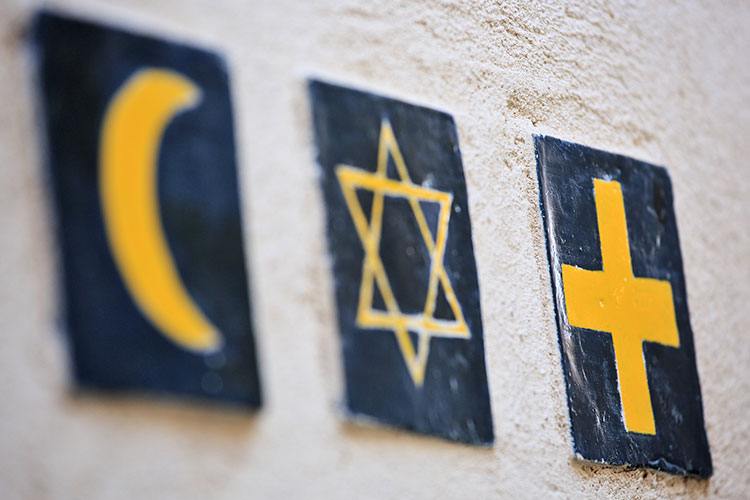Yes, you may trademark a religious symbol so long as the mark does not consist of, or comprise, matter that may disparage, bring into contempt or disrepute persons, institutions, beliefs, or national symbols.

For example, the courts have held that when the application of a mark to a product would offend the sensibilities of a religious group, the mark should be refused on the basis that the matter is disparaging to the members of the group. If you utilize a religious sign to brand a product or service in a way that is not offensive or insulting to the religion that it represents, you will be allowed to trademark it. If you successfully trademark a religious symbol, the legal protection will only serve to prevent your competitors from using the religious symbol in a way that would cause consumers to be confused as to where the goods or services are coming from. The trademark would not prevent individuals from using the symbol in non-competitive ways, nor would it prevent the associated religion from using the symbol in worship. As a number of trademarks exist for religious symbols, we advise you to contact us so that a licensed trademark attorney may perform a trademark search to verify its availability for you.
Addressing Scandalous Matter and Religious Sensitivities
The United States Patent and Trademark Office (USPTO) scrutinizes trademark applications for scandalous matter or content that may be considered offensive to public morality or religious susceptibilities. In a landmark case, Lal Babu Priyadarshi sought to trademark a religious name, highlighting the complex interplay between religious symbols and intellectual property rights. Lal Babu had applied to register the trademark “RAMAYAN” which also depicted a picture of a crown for his range of incense sticks. However, Ramayan is also the name of a religious book in India and was opposed by Amritpal Singh who states that Lal Babu “could not claim a monopoly on the name of a religious book”. The mark was originally successfully registered as a trademark after it was believed it had acquired “distinctiveness” and could be differentiated from other goods on the market. However, after the appeal and a Supreme Court case, it was eventually ruled that Lal Babu was denied registering his trademark “RAMAYAN” after it was agreed it was used too generally by the public and the religious imagery used on the product was “impermissible for the purposes of registration”. This case underscored the necessity of balancing respect for religious practices and the principles of trademark law in a secular country.
Religious Trademarks and the Requirement for Distinctive Character
A religious symbol or sign must acquire a secondary meaning that distinguishes the goods or services it represents from those of other commercial entities. This distinctive character is a crucial requirement for trademark registration. For example, a religious book or symbol used by a religious entity may be trademarked if it has gained recognition in the market for its commercial source rather than solely for its religious significance.
The Role of Trademark Registration in Protecting Religious Symbols
Trademark registration offers exclusive rights to use a religious symbol in the marketplace, preventing confusion among consumers regarding the origin of goods or services. However, these rights are carefully granted to ensure they do not infringe on the general public’s or the religious community’s freedom to use the symbol in a non-commercial context. Moreover, combinations of religious symbols with other elements may be considered for registration if they meet the criteria for having a distinctive character and do not offend religious susceptibilities.
Navigating Intellectual Property Rights for Religious Names and Symbols
When dealing with religious names and historical personages in trademark applications, the USPTO may issue a refusal of registration if the name is primarily associated with a religious figure or doctrine, unless consent from the relevant religious entity is provided. This policy aims to respect the rights of religious groups and individuals while navigating the commercial aspects of intellectual property.
Further Reading
You may also be interested in an explanation of if you can trademark a church name.
The Trademark Process
The intersection of trademark law and religious symbols is a nuanced area requiring careful consideration of various factors, including the potential for disparagement, the need for a distinctive character, and respect for religious practices and sensitivities. Consulting with an experienced trademark attorney can help navigate these complexities, ensuring that your trademark application aligns with legal requirements and respects broader societal values. Check out the video below to learn how we can work together.

